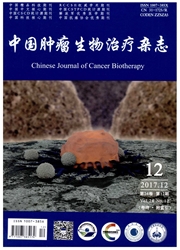

 中文摘要:
中文摘要:
目的:分析转移性大肠癌LoVo细胞特异性核酸适配子W14的生物活性和血浆稳定性。方法: 采用荧光显微镜流式细胞术分析W14在25 ℃和37 ℃下与靶细胞LoVo的特异结合活性;流式细胞术检测W14在血浆环境下对LoVo细胞的特异识别能力;37 ℃ 下W14分别在完全培养基和人血浆中孵育0.5、1、1.5、2、3、4、6 h, 琼脂糖凝胶电泳检测W14的生物稳定性;用2、4、8、10 μmol/L 的W14处理LoVo细胞24、48、72 h,MTS实验测定W14的细胞毒性。结果: W14在不同温度和血浆环境中以及不同温度条件下都能特异性地识别和结合靶细胞LoVo,能稳定地存在于血浆中6 h不发生降解,且对细胞没有明显的毒性作用。结论: 转移性大肠癌特异性核酸适配子W14具有良好的适应能力和特异性结合能力,有较好的生物稳定性和低毒性,适应于人体内应用。
 英文摘要:
英文摘要:
Objective:To analyze the biological activity and plasma stability of specific aptamar W14 to metastatic colorectal cancer LoVo cell. Methods: Fluorescence microscopy was used to observe the specific binding activity of W14 to target LoVo cells under 25 ℃ and 37 ℃; Flow cytometry was used to detect W14 recognition ability of LoVo cell in plasma environment. W14 was respectively incubated in complete culture medium and human plasma for 0.5, 1, 1.5, 2, 3, 4 and 6 h under 37 ℃, and Agarose gel electrophoresis was used to observe the biological stability of aptamer W14; LoVo cells were treated with W14 at different concentrations (2,4,8,10 μmol/L) for 24, 48 and 72 h, and MTS was used to investigate the cytotoxicity of aptamer W14. Results: The aptamer W14 could specifically recognize the target LoVo cells under different temperatures and plasma environments, and it could stably exist in plasma for 6 hours without degradation, in addition, it had no obvious toxic effect on cells. Conclusion: Metastatic colorectal cancer-specific aptamer W14 is suitable for in vivo use, with superior adaptability, good biological stability and low toxicity.
 同期刊论文项目
同期刊论文项目
 同项目期刊论文
同项目期刊论文
 期刊信息
期刊信息
